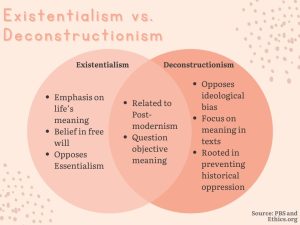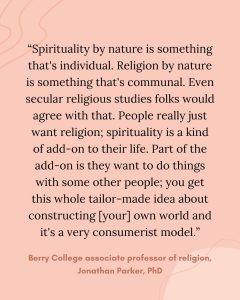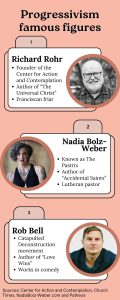From the days of imperialism to the Civil Rights Movement in the 1950s, self-proclaiming Christians have used the Bible to justify their beliefs, even if those ideals did not align with the words of the Scripture. In using the text to defend varying viewpoints on social issues, the authors of the Bible experienced a distortion of their intended meaning. Because of these misrepresentations, the mid-20th century Church experienced a decline in attendance and influence, which caused American society to shift from the Protestant ideals they once held, ultimately creating an increasingly secular population. A study conducted by Gallup found that the percentage of those who believed that religion remained very important dropped by almost 15% between 1966 and 1976. Though this deviation from the Church aimed to reflect the changing times and mirror the progressively advancing world, this change has further distorted the Christian faith. The decreasing influence of the Church has adversely paralleled the dilution of the Gospel, merely in different ways than it used to. Christianity in America experiences the same distortion as it did centuries ago, though it spans to different forms, with ideals that aim to shift away from traditionalist beliefs such as Progressivism.
Further down the road in American history, communities of color began to fight for equal rights with the Civil Rights Movement. Prominent figures of this movement, including Martin Luther King Jr., proclaimed their beliefs with the support of Scriptures from the Bible. King’s famous “I Have a Dream” speech alluded to and quoted various verses from Old Testament prophets such as Isaiah and Amos. This furthered the use of Scripture to defend a diverse array of ideals held by a plethora of social groups and signified a shift away from the colonial narrative that God supported imperialist states.
In modern-day America, however, a trend has risen in which society aims to shift away from Biblical influence. This shift intends to take a different path; rather than reciting Biblical verses to confirm notions of gender roles and segregation, current Americans hope to decrease the influence of the Church on their lives. While this newfound alteration comes from a belief that the Bible’s minimized eminence will approve an ever-evolving society or prevent the further distortion of Scripture, this shift swings to the other side of the continuum. Instead of distorting Scripture in the views of social extremism, current ideologies that aim to reflect the progressive adjustment in ideals, such as Postmodernism, have instead watered down Christianity in an attempt to fix past issues.
Beginning with the Enlightenment, which emphasized Modernism — the search for absolute meaning found in scientific and intellectual thinking — emerging European scholars viewed the world differently. In pitting science and human reason against faith and spirituality, people began to distance themselves from the Christian faith due to the inception of modernist ideals. Later, in the 20th century, various brilliant minds of the time felt uncertain about this ideal of absolutism; they began to steer away from Enlightenment influence, asserting that modern society had failed the world. As a result, Postmodernism emerged to combat the notion of objectivity.
“I think from a Christian perspective, Modernism was a problem and Postmodernism is a problem, so Christians would want to take maybe the best of both without conceding to either. Modernism tended to be really dismissive of Christianity and dismissive of the claim that Christians know the truth and the truth is in Jesus Christ. He’s the way, the truth and the life. We need the perspective of faith in order to even understand the world. And Modernists would be very dismissive and just sort of say, ‘science is about the facts. Your religion is kind of like your private faith. It’s got nothing to do with truth. It’s got nothing to do with objectivity.’ Now Postmodernism comes and says, ‘everyone has faith. Everyone comes at this from a perspective of faith.’ Faith not in the biblical sense, but just in terms of our biases and perspectives. So what Postmodernism did is it leveled the field. So now, not even science is on the throne; we’re all kind of on an equal playing field. What was interesting is that some Christians actually were like, ‘oh, this is great because now we have a seat at the table again, because Postmodernism has leveled everything.’ So there are some Christians who actually saw Postmodernism as a really good thing because it critiqued Modernism, and then that opened the door for Christians to come back to the table,” Covenant College professor of theology Hans Madueme, MD, PhD, said.
The paradoxical irony lies within specific principles of contemporary beliefs. Postmodernism characterizes a skepticism of 20th-century Western philosophy and, ultimately, a reaction against classical liberalism, as defined by Firebrand lead editor Dr. David Watson. In an attempt to destabilize existing conservative religious ideals, Postmodernism paved the way for man to reform society in his own will, not by that of a previous way of life. This notion breaks off into further categories, which increasingly change interpretations of Christian faith in their own sense. Deconstructionism and Existentialism include merely two of the sub-ideals that relate to Postmodernism, and their doctrine may prove detrimental to modern Christianity.

Pastor Timothy Keller, a contributor to “The Supremacy of Christ in a Postmodern World,” writes that this ideal poses three resistances to traditional Christianity. In sum, Keller claims that Postmodernism’s suspicion of objective meaning directly opposes the sound Scriptural belief that the Bible maintains its status as factually true. Furthermore, this poses tension with the Christian belief of evangelizing; Keller writes that since Postmodernism seeks to dismantle absolute truth in a single text and focus primarily on intended interpretation, the pillar of Christian faith that stands in spreading the Gospel — known as the Great Commission — becomes increasingly difficult to abide by. According to the theologian, the idea of proselytizing authentic beliefs comes face-to-face with a mindset intended to filter all knowledge through a subjective lens, straining a vital component of Christianity and creating difficult circumstances for those who wish to share their faith.
“Let me just start off with saying people and Christians should not be subjective in our faith. The Bible is not subjective. It is objective. Subjectivity seems to make its way into culture nowadays. So I would say, personally, in my experience, subjectivity has affected different groups of people in different ways. So if you look at one people group, let’s say the Lesbian, Gay, Bisexual and Transgender+ (LGBT+) community, I would say subjectivity-wise has made them a lot more comfortable to become Christian, but also has made them way more comfortable with sharing the Gospel and bringing the Gospel to people of that caliber. And I also know the flip side of that, which is that subjectivity takes some Christians’ ideas that aren’t necessarily right at all, that certain people groups or certain ideas or sins are below them. And so they either don’t want to or are more afraid of sharing the Gospel with those people due to their subjectivity and their personal beliefs, which I personally disagree with,” sophomore Gavin Brillinger said.
The hindrance to evangelism further works into the ideas of Existentialism and Deconstructionism. Where both ideals seek to strip the concept of life and meaning down to abstract components, Christianity’s steadfastness to textual faith proves a disconnect to current culture. Existentialism, based on the belief that man can find meaning through his own free will and individual perspective as opposed to the existence of a higher power, imposes on the American Christian Church and infiltrates into the belief of God as the higher power above humanity. Writer and pastor John Piper dedicates a section of his work “Don’t Waste Your Life” to this ideal alone and asserts that all objective reality essentially dies when society decides to focus on interpreted meaning rather than real meaning, which completely negates the Bible. Thus, the Bible ought to remain true, or else Christianity loses its stability. In a similar vein, Deconstructionism challenges the idea that text holds on specific meaning, charting a new course for the way today’s Christians view the Bible. Instead of a book to learn from and revere as holy, Deconstructionism paints the Bible as a mere text encompassing infinite meanings within, which detracts from the essence of historical Christianity as a whole that sought to navigate and uphold the meaning found in Scripture.

Boiling down these two movements comes the umbrella of Progressivism. While Postmodernism — including both Existentialism and Deconstructionism — may fall under the branches of Progressivism, this term essentially refers to a modern-day view of Scriptures and Christian beliefs. Numerous pastors, theologians and Christian scholars warn congregations of the dangers of these movements, attesting that the Progressive Christianity movement seeks to dismantle traditional Christianity and secularize the Church.
Though their claims derive from a customary lens, data from the Public Religion Research Institute (PRRI) shows that in 2013, 19% of Christians identified as religious Progressives. Though these statistics may seem outdated, another PRRI study in 2018 found an increase in these numbers — with 32% of participants identifying as Consistently Progressive or Liberal — and numerous sources report that the values grow each year. As the amount of those who wind off the traditional path begin to follow Progressive ideals, an ever-escalating number of Christians report to support social issues such as LGBTQ+, gender equality and pro-choice movements. Each of these movements derives influence from notions outside of defined Biblical ideas, with growing traction in the 21st century.

Since numerous differing political and societal ideologies feature Christianity at the forefront of their platform, the idea of historical Christianity has experienced a breakaway from its intentions. Avoiding or shedding light on the distortions of Biblical Christianity begins in rightly terming beliefs for what they hold. Calling these numerous ideologies as Christian only further confuses and divides those who may not know the distinct weavings between each belief, so naming ideas for their specifications — whether Progressive, Protestant or Postmodern — helps to distinguish the individualistic beliefs in each sect. Furthermore, proper research remains vital for young or new believers to prevent influence from ideals not specifically rooted in the Bible.
Curious seekers at NC who do not know where to begin their research can find various local Church organizations rooted in the Bible. Lifebridge Community Church stands as an example of Christians dedicated to studying, memorizing and applying the Bible into their life. Furthermore, clubs at NC, such as Collective Hope Club (CHC) and Fellowship of Christian Athletes (FCA), dedicate their meetings and school outreach to helping students of different backgrounds grow in their faith and teaching attendants to recognize what Scripture truly means.
“I think I’d go [to apologetics] very quickly because Progressive Christianity, Postmodernism, post-Christian people, they take little things to discredit everything. And so I think I really need to know my Bible. I need to know how to navigate that. When somebody would say, ‘How can you believe in a God who endorses slavery?’ Because you see slavery in the Bible, right? Well, first of all, that’s a bad question based on a wrong presupposition. God never endorsed slavery. And if I don’t know how to handle [basic apologetics] as a Christian or my way around Scripture or that God never did endorse slavery, if you don’t know those things, then you get tripped up in all of that,” Lifebridge Community Church senior pastor Alan Scott said.
Though misunderstandings and various modern influences cause contention within the American Church as a whole, it remains important to acknowledge that these beliefs do not merely fall under the blanket term of Christianity. Each influence, belief and ideology holds different priorities and standards that society simply cannot compare but must recognize as distinctly different. For the benefit of each denomination, knowledge stands as key to understanding the influence of modernity and its separation from traditional Christianity.














